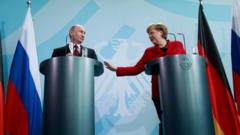Merkel's leadership saw significant events such as the Russian annexation of Crimea in 2014 and the refugee crisis of 2015, both of which have drawn scrutiny over her approach. While she maintained that her refusal to allow Ukraine into NATO was crucial for peace, critics claim that this decision may have inadvertently empowered Russian aggression. Amid concerns over rising nuclear threats from Russia, Merkel highlighted the need for global diplomacy and preventing escalation in tensions.
During her time in office, Merkel perceived herself as a mediator between Western powers and Putin's Russia, continually advocating for understanding and cooperation. However, the reality post her departure from office showcased a shift in European energy policies, leading to a hurried reevaluation of relationships with Moscow, particularly in light of the invasion of Ukraine.
Merkel's decisions on energy policies fostered a greater dependency on Russian gas, which has become a contentious issue as European nations grapple with energy shortages and rising costs. Critics assert that her policies contributed to Russia's military undertakings by bolstering its financial capacity, though Merkel stresses that her intentions were rooted in securing peace and stability within Europe.
As public sentiments shift, with rising political polarization in Germany - evidenced by the popularity of the far-right Alternative for Germany (AfD) party - Merkel's legacy faces reevaluation as the nation looks back at both the successes and failures of her 16-year leadership. Furthermore, while she acknowledges the importance of addressing illegal migration to combat far-right movements, she maintains that the general welfare of European nations must be prioritized to reduce pressures from migration.
Now enjoying a more private life after stepping down, Merkel reflects on her experiences and the lessons learned during her leadership amid a challenging geopolitical landscape, expressing contentment with her current life away from the political spotlight.
During her time in office, Merkel perceived herself as a mediator between Western powers and Putin's Russia, continually advocating for understanding and cooperation. However, the reality post her departure from office showcased a shift in European energy policies, leading to a hurried reevaluation of relationships with Moscow, particularly in light of the invasion of Ukraine.
Merkel's decisions on energy policies fostered a greater dependency on Russian gas, which has become a contentious issue as European nations grapple with energy shortages and rising costs. Critics assert that her policies contributed to Russia's military undertakings by bolstering its financial capacity, though Merkel stresses that her intentions were rooted in securing peace and stability within Europe.
As public sentiments shift, with rising political polarization in Germany - evidenced by the popularity of the far-right Alternative for Germany (AfD) party - Merkel's legacy faces reevaluation as the nation looks back at both the successes and failures of her 16-year leadership. Furthermore, while she acknowledges the importance of addressing illegal migration to combat far-right movements, she maintains that the general welfare of European nations must be prioritized to reduce pressures from migration.
Now enjoying a more private life after stepping down, Merkel reflects on her experiences and the lessons learned during her leadership amid a challenging geopolitical landscape, expressing contentment with her current life away from the political spotlight.





















